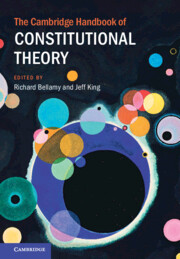Book contents
- The Cambridge Handbook of Constitutional Theory
- The Cambridge Handbook of Constitutional Theory
- Copyright page
- Contents
- Figures
- Contributors
- Frontispiece
- Preface and Acknowledgements
- 1 Introduction
- Part I Values
- 2 Human Dignity
- 3 Rights
- 4 Equality
- 5 Liberty
- 6 Well-Being
- 7 Self-Government
- 8 Justice
- 9 Recognition
- Part II Modalities
- Part III Institutions
- Part IV Challenges for Constitutional Democracy
- Bibliography
- Index
- References
9 - Recognition
from Part I - Values
Published online by Cambridge University Press: 27 March 2025
- The Cambridge Handbook of Constitutional Theory
- The Cambridge Handbook of Constitutional Theory
- Copyright page
- Contents
- Figures
- Contributors
- Frontispiece
- Preface and Acknowledgements
- 1 Introduction
- Part I Values
- 2 Human Dignity
- 3 Rights
- 4 Equality
- 5 Liberty
- 6 Well-Being
- 7 Self-Government
- 8 Justice
- 9 Recognition
- Part II Modalities
- Part III Institutions
- Part IV Challenges for Constitutional Democracy
- Bibliography
- Index
- References
Summary
The witholding of equal public recognition of national, cultural and language identity often causes severe anguish to sub-state peoples and sometimes leads to war. For this reason, political philosophy has an important responsibility to think through the moral grounds and the appropriate means of recognition. This chapter draws a moral map of the recognitional debate, outlining three normative camps: nonrecognition, monorecognition, and recognitional pluralism. I argue for recognitional pluralism, in two steps. The first step establishes, contra nonrecognition, that nations, cultures and languages are recognition-worthy, and that this is so for two reasons: they give people access to cultural life-worlds, and they are sources of dignity. The second step builds the case for a pluralistic means of according public recognition. To do so, I argue, against monorecognition, that egalitarian recognition of life-world access and dignity is to be the driving principle. Within the pluralist camp, I argue for the principle of equal services, which implies that the state accords comparable cultural services to the cultural groups that share a state or territory. Examples of this can be found in equal language rights regimes, egalitarian public holiday systems, as well as in multinational federalism.
Keywords
- Type
- Chapter
- Information
- The Cambridge Handbook of Constitutional Theory , pp. 136 - 154Publisher: Cambridge University PressPrint publication year: 2025

